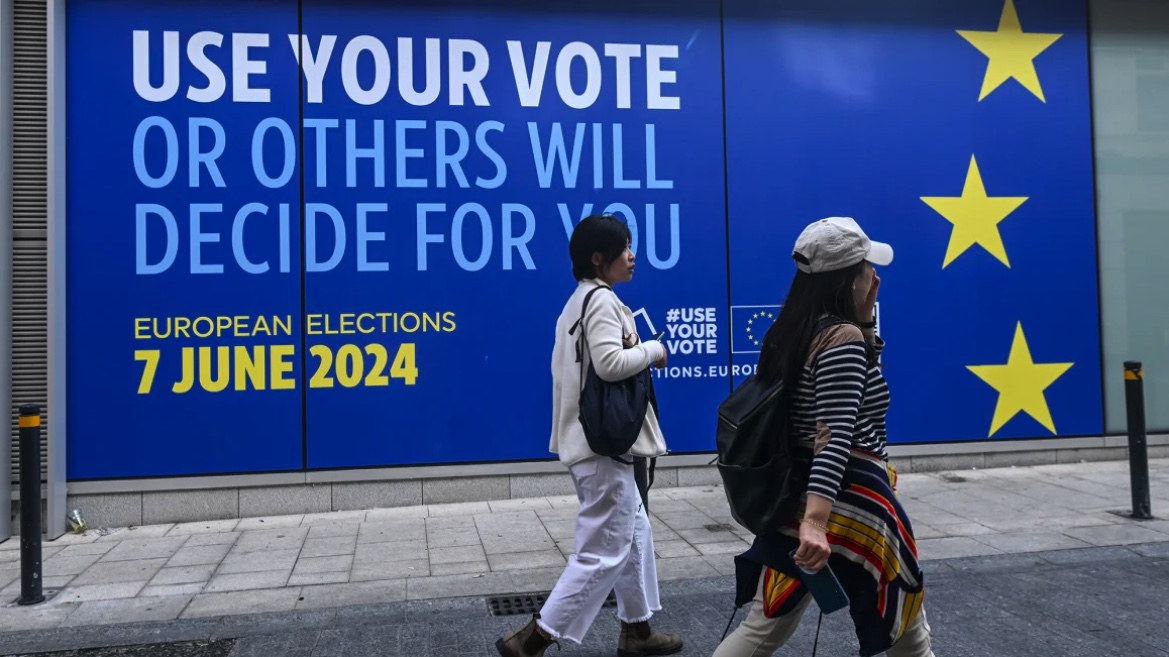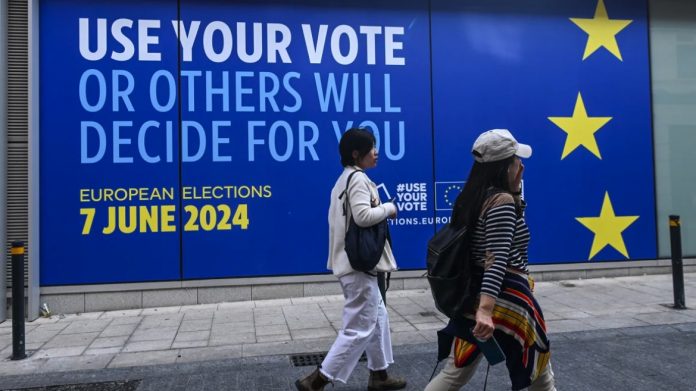ปีนี้มีความสำคัญอย่างยิ่งต่อระบอบประชาธิปไตยทั่วโลก โดยมีประมาณ 70 ประเทศ รวมถึงสหรัฐอเมริกา แอฟริกาใต้ เม็กซิโก และไต้หวัน ที่จะมีการเลือกตั้งในปี 2567 ชาวยุโรป 373 ล้านคนจะเลือกสมาชิกรัฐสภายุโรป 720 คน ทำให้เป็นการเลือกตั้งครั้งใหญ่ที่สุด โดยการนับคะแนนเสียง ผลลัพธ์คาดว่าจะแสดงให้เห็นถึงการเปลี่ยนแปลงที่สำคัญไปทางขวา ซึ่งอาจส่งผลกระทบต่อทิศทางทางการเมืองของสหภาพยุโรปท่ามกลางวิกฤตการณ์ต่างๆ ทั่วโลก แม้จะมีความแตกต่างอันยาวนานระหว่างประเทศสมาชิก แต่สหภาพยุโรปก็ยังอาศัยความเป็นพันธมิตรระหว่างอุดมการณ์ทางการเมืองที่หลากหลาย ในช่วงสองทศวรรษที่ผ่านมา ศูนย์กลางทางการเมืองของสหภาพยุโรปได้ขยับไปฝ่ายขวาอย่างเห็นได้ชัด
รัฐสภายุโรปนำเสนอพลวัตทางการเมืองของสหภาพยุโรป สมาชิกสภาผู้แทนราษฎรเข้าร่วมกลุ่มข้ามชาติในกรุงบรัสเซลส์โดยพิจารณาจากพรรคในประเทศของตน การจัดกลุ่มเหล่านี้ก่อให้เกิดแนวร่วมแบบศูนย์กลางจากฝ่ายซ้ายกลาง ฝ่ายขวากลาง และเสรีนิยม ตั้งแต่ปี 2542 พรรคประชาชนยุโรป European People’s Party (EPP) ที่เป็นพรรคกลางขวา ซึ่งคล้ายกับพรรคอนุรักษ์นิยมอย่าง Angela Merkel ก็ได้มีอำนาจเหนือกว่า แม้ว่า EPP จะเป็นผู้นำแนวร่วมสายกลางกับฝ่ายซ้ายและเสรีนิยม แต่การเมืองภายในประเทศก็มีอิทธิพลอย่างมากต่อสมาชิกรัฐสภา ตัวอย่างเช่น พรรคอนุรักษ์นิยมอาจพบว่าเป็นการยากที่จะร่วมมือกันในเรื่องนโยบายของสหภาพยุโรป หากผู้ลงคะแนนของพวกเขาชอบประชานิยมที่ต่อต้านการย้ายถิ่นฐาน การเพิ่มขึ้นของผู้ร่างกฎหมายที่คาดว่าจะได้รับสิทธิของ EPP จะทำให้การเปลี่ยนแปลงเหล่านี้ซับซ้อนยิ่งขึ้น
กลุ่มอนุรักษ์นิยมและปฏิรูปยุโรป right-wing European Conservatives and Reformists (ECR) ฝ่ายขวา และกลุ่มอัตลักษณ์และประชาธิปไตย far-right Identity and Democracy (ID) ฝ่ายขวาจัด คาดว่าจะได้ที่นั่งในอันดับที่สี่และห้า โดยจำนวนที่นั่งรวมกันอาจมากกว่า 140 ที่นั่ง ส่งผลให้ยากที่ EPP จะเพิกเฉย คาดการณ์ว่า EPP จะได้รับที่นั่ง 165 ที่นั่ง แซงหน้าพรรค S&D สังคมนิยมที่มี 143 ที่นั่ง ECR ซึ่งก่อตั้งโดยอดีตนายกรัฐมนตรีอังกฤษ David Cameron และปัจจุบันมีนายกรัฐมนตรี Giorgia Meloni ของอิตาลีเป็นประธาน ประกอบไปด้วยกลุ่มอนุรักษ์นิยมที่หลากหลาย Meloni ซึ่งเป็นที่รู้จักจากวาทศิลป์ต่อต้าน LGBTQ+ และต่อต้านโลกาภิวัฒน์ ได้กลั่นกรองจุดยืนของเธอนับตั้งแต่การเลือกตั้ง โดยสนับสนุนความคิดริเริ่มของสหภาพยุโรป และต่อต้านการเข้าสู่ ECR ของผู้นำฮังการี Viktor Orban นอกจากนี้ ID ยังได้พยายามกลั่นกรองภาพลักษณ์ของตน โดยเมื่อไม่นานมานี้ ได้มีการไล่พรรค AfD ที่เป็นพรรคขวาจัดของเยอรมนีออก หลังจากที่สมาชิกสภาผู้แทนราษฎรอาวุโสคนหนึ่งกล่าวอย่างขัดแย้ง
ความคิดเห็นภายใน ECR และ ID แตกต่างกันอย่างมาก แต่พลวัตทางการเมืองมักจะสร้างพันธมิตรที่ไม่คาดคิดในการเมืองยุโรป แม้ว่าการทำงานร่วมกันโดยตรงระหว่าง EPP และ ID ดูเหมือนจะไม่น่าเป็นไปได้ แต่อิทธิพลของทั้งสองก็ไม่ควรถูกมองข้าม ประวัติศาสตร์ได้แสดงให้เห็นว่าแรงกดดันจากภายนอกสามารถกำหนดนโยบายได้ ฝ่ายขวากำลังเผชิญกับปัญหาเร่งด่วน เช่น การอพยพ การเปลี่ยนแปลงสภาพภูมิอากาศ และความมั่นคงชายแดน ซึ่งยังคงกระตุ้นให้เกิดการเมืองทั่วยุโรป บทบาทของรัฐสภาในการอนุมัติคณะกรรมาธิการยุโรปเป็นสิ่งสำคัญ ดูเหมือนว่าการสนับสนุนยูเครนจะปลอดภัย แต่เรื่องอื่นๆ จะได้รับการจัดการเป็นกรณีๆ ไป ซึ่งอาจเพิ่มอิทธิพลของสมาชิกสภาผู้แทนราษฎรฝ่ายขวาได้มากขึ้นเมื่อเวลาผ่านไป การเมืองภายในประเทศในประเทศสมาชิกอาจเปลี่ยนแปลงไปมากกว่านี้ในช่วงวาระ 5 ปีของรัฐสภา ซึ่งส่งผลให้การคำนวณในกรุงบรัสเซลส์เปลี่ยนแปลงไป แม้จะมีรูปลักษณ์ของระบบราชการ แต่สหภาพยุโรปก็ยังคงแสดงตนในเชิงภูมิรัฐศาสตร์มากขึ้น การเปลี่ยนไปทางขวาในศูนย์กลางทางการเมืองอาจส่งผลกระทบ นอกขอบเขตของยุโรป
The far-right is poised to achieve significant gains in the EU elections, potentially shaping European politics for the next five years.

This year is crucial for global democracy, with around 70 countries, including the US, South Africa, Mexico, and Taiwan, holding elections in 2024. 373 million Europeans will elect 720 members of the European Parliament, making it the largest election by voter count. The results are expected to show a significant shift to the right, which could impact the EU’s political direction amid various global crises. Despite long standing differences among member states, the EU has relied on alliances between diverse political ideologies. Over the past two decades, the EU’s political centre has shifted noticeably to the right.
The European Parliament showcases the EU’s political dynamics. MEPs join multinational groupings in Brussels based on their home country’s parties. These groupings form centrist coalitions from the centre-left, centre-right, and liberals. Since 1999, the centre-right European People’s Party (EPP), similar to conservatives like Angela Merkel, has been dominant. Although the EPP leads a centrist coalition with the left and liberals, domestic politics heavily influence MEPs. For example, conservatives may find it hard to collaborate on EU policies if their voters prefer anti-immigration populists. An expected increase in lawmakers to the EPP’s right will complicate these dynamics further.
The right-wing European Conservatives and Reformists (ECR) and far-right Identity and Democracy (ID) groups are expected to place fourth and fifth in seats, with a combined total possibly over 140, making them hard for the EPP to ignore. The EPP is predicted to win 165 seats, ahead of the socialist S&D’s 143. The ECR, founded by former British PM David Cameron and now chaired by Italian PM Giorgia Meloni, includes a broad range of conservatives. Meloni, known for her anti-LGBTQ+ and anti-globalist rhetoric, has moderated her position since her election, supporting EU initiatives and resisting Hungarian leader Viktor Orban’s entry into the ECR. ID has also sought to moderate its image, recently expelling the German far-right AfD party after controversial remarks by one of its senior MEPs.
Opinions within the ECR and ID vary widely, but political dynamics often create unexpected alliances in European politics. While direct collaboration between the EPP and ID seems unlikely, their influence shouldn’t be underestimated. History has shown external pressure can shape policy. The right-wing faces pressing issues like migration, climate change, and border security, which continue to stir pan-European politics. The Parliament’s role in approving the European Commission is crucial. Support for Ukraine seems secure, but other matters will be handled case-by-case, potentially increasing the influence of right-leaning MEPs over time. Domestic politics in member states could shift further right over the Parliament’s five-year term, altering calculations in Brussels. Despite its bureaucratic appearance, the EU is increasingly asserting itself geopolitically. A shift to the right in its political centre could have significant implications beyond Europe’s borders.
By CNN NEWS

















